Student Personnel Association honors eight student services professionals
The Madison Student Personnel Association recognized the work of eight distinguished employees who work in student services at UW–Madison at its 2017 reception on May 5.
Founded in 1956, the SPA exists to create connections among people who work with students to support, enhance and reinforce the university’s learning mission. Membership is also open to student services professionals from around the area, including Edgewood College and Madison College, which presented their own campus awards during the ceremony.
Chancellor’s Award
Margaret Nellis, Academic Partnerships manager in the Healthy Campus unit of University Health Services, received the Chancellor’s Award, the association’s highest honor. The award recognizes campus leaders who provide distinguished service to the university community and students, particularly beyond the scope of their office. It also recognizes distinctive contributions throughout the campus community in all aspects of their professional and personal lives.
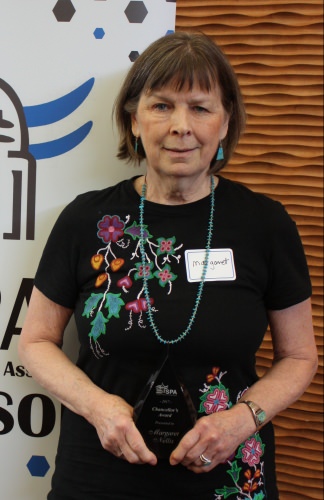
Margaret Nellis
“When I think of Margaret’s contributions to campus, I immediately think of a list of activities or programs that are excellent examples of lifting up students who need it most in a way that contributes to the broader public good — and these are things that Margaret seems to accomplish in the evenings and on weekends, above and beyond her job requirements,” writes Katherine Cramer, a political science professor and faculty director for the Morgridge Center for Public Service, in nominating Nellis.
Colleagues call Nellis a “boundary spanner” — someone who unites people and organizations across silos, geographies, class and race. In particular, they praise her vital efforts to build strong relationships between South Madison and UW–Madison.
Early in her career at UW–Madison, Nellis championed a shift from the “old” method of health promotion, in which information was provided to students in hopes they would make healthy behavioral choices, to one that focuses on changing culture—policies, systems, norms and environments—to affect individual behavior, says Katherine Loving, program manager for Healthy Campus.
“Margaret’s expertise in the relationship between student health and learning was perfectly suited to this new approach, though it was not an approach widely adopted by student health promotion programs—and still isn’t; UW–Madison is a leader in this area,” Loving writes in her nomination letter.
Frontline Award
The Frontline Award recognizes staff members who positively influence students’ perceptions of the university, either as the first person students meet in an office or supporting a unit behind the scenes.
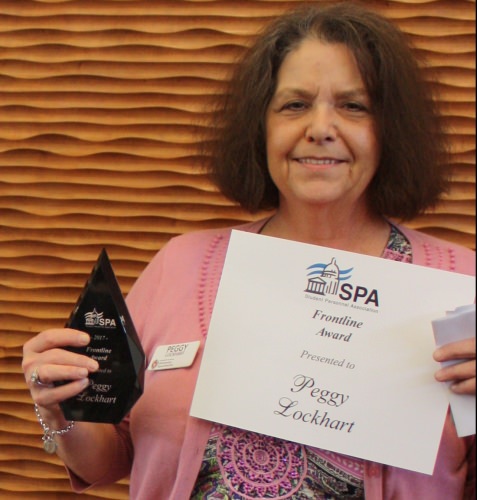
Peggy Lockhart
As leasing coordinator for University Apartments within the Division of Housing, Peggy Lockhart is the primary contact for applicants and residents of the 1,243 apartments in Eagle Heights, University Houses and Harvey Street Apartments. She provides public relations, customer service and assistance, and plays a vital role in maintaining the integrity of the University Apartments database.
Nominators said Lockhart’s dedication to serve students in a culturally diverse community exemplifies the office’s core value of stewardship and personalizes the inclusive excellence the university prides itself on.
“Everybody knows Peggy,” says Linda Abegglen,
director of administrative services and leasing for University Apartments. “She is the only person from University Apartments that all leaseholders are in contact with at least once. For some, she may be the only person from Housing that they interact with during their stay in University Apartments. As one of our residents joked, ‘When I came to America, I knew of two people – Barack Obama and Peggy Lockhart.’”
Norman Bassett Award
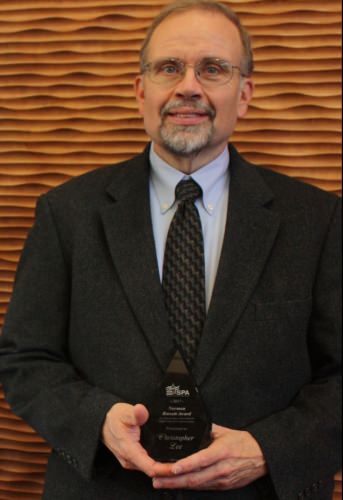
Christopher Lee
Christopher Lee, assistant dean and director of Academic Deans’ Services, Letters & Science Student Academic Affairs, received the Norman Bassett Award for Outstanding Achievement in Higher Education Administration. The award recognizes excellence in student services work of 10 years or more and/or distinguished achievement in developing new, creative and effective programs to meet student needs.
Lee is called a “legend” for his integrity, empathy, institutional memory, critical-thinking skills and efforts to champion underrepresented students.
“Christopher Lee is the ultimate student advocate,” writes one group of colleagues in nominating him. “His deep knowledge of university policy and practice, coupled with an exceptional sense of ethics and reason make him an absolute go-to person for dealing with the most complicated of student problems.”
Associate Dean Cal Bergman, L&S Student Academic Affairs, says Lee “has a record that demonstrates outstanding service that is second to none to the college and university throughout his career.”
Excellence in Higher Education Administration
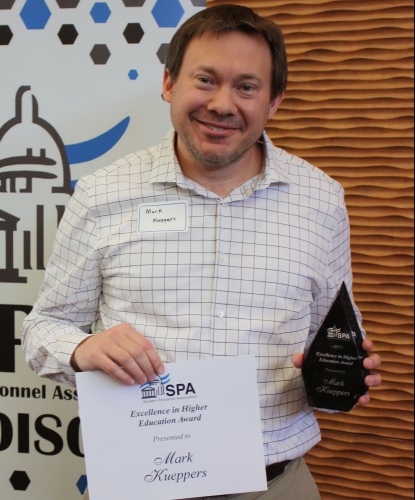
Mark Kueppers
Mark Kueppers, associate director in the Center for Leadership & Involvement, Division of Student Life, oversees the center’s day-to-day operations and its outreach programming efforts and assists with strategic planning. He received the Award for Excellence in Higher Education Administration, recognizing effective qualities and practices that distinguish a leader in student services.
His commitment to leadership development across UW–Madison is unparalleled, says his supervisor, Assistant Dean Eric Knueve, director of the Center for Leadership and Involvement. After attending a conference in 2011, Kueppers embarked on a journey to better understand how UW–Madison developed student leaders. Working with others, he formed the Coordinated Leadership Initiative, which led to the first-ever UW–Madison Leadership Framework.
“The framework has been adopted across campus in a variety of ways, which indicates that all of this hard work has indeed captured the essence of being a leader at UW–Madison,” Knueve writes in his nomination letter.
Campus Impact Award
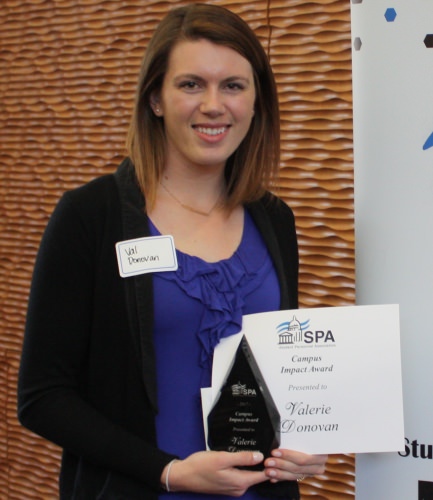
Valerie Donovan
Two University Health Services staff members who work in prevention received Campus Impact Awards, which recognize professionals who have had a significant impact on campus in fewer than five years.
Valerie Donovan works in the Health Campus unit as suicide prevention coordinator. She began her career in this position as the leader of a federal suicide prevention grant, then successfully facilitated the institutionalization of the grant programs and cross-campus Suicide Prevention Council, and now continues to build the capacity of UW–Madison to promote and support positive mental health for students.
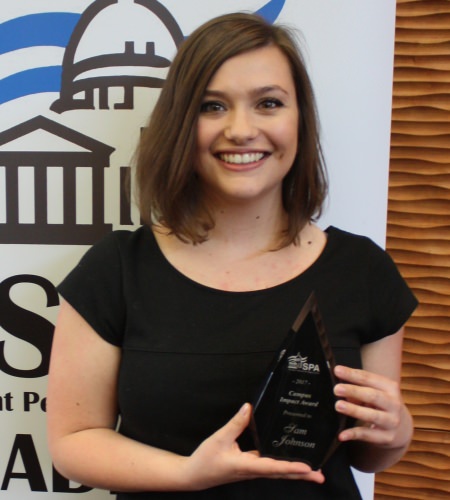
Sam Johnson
“She continues her work with a quiet determination and an entrepreneurial spirit, always finding a way to reach program goals, carry the weight of key collaborations, and leap over administrative barriers in a single bound,” says her supervisor, Katherine Loving.
Samantha “Sam” Johnson, a violence prevention specialist, is lauded for her contributions to and management of many efforts, including her leadership in the Men and Masculinities Initiative and the Green Dot College Strategy. When UW–Madison recently began requiring a 90-minute, in-person violence prevention workshop for all new students, Johnson served as the lead prevention practitioner, coordinating all elements of the operation.
“Sam is a magician, and through the process of rolling out a new and important service to campus, always kept her eye on the student experience,” says Carmen Juniper Neimeko, former team manager, UHS Violence Prevention & Survivor Services.
Leadership in Social Justice Award
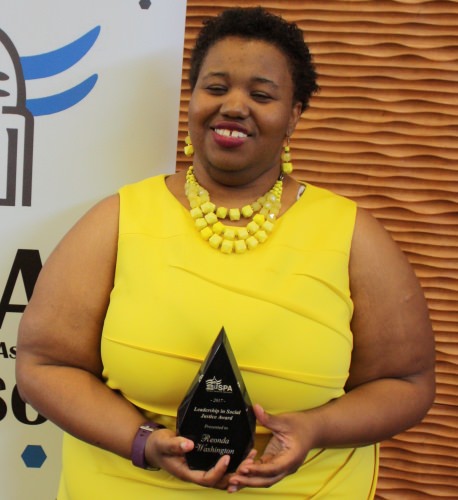
Reonda Washington
Reonda Washington and Laura Klunder each received Leadership in Social Justice Awards, recognizing leadership and courage while initiating, creating and supporting a more socially just learning and work environment for students and staff, whether within or beyond the scope of the recipient’s current position.
Washington is the prevention coordinator for alcohol and other drugs on the Health Campus team at University Health Services. The position’s focus is on designing, developing and implementing prevention-based outreach and education services, with an emphasis on the prevention of high-risk drinking. Washington is responsible for administering the Alcohol Edu program and the Color of Drinking Survey, and her data collection and analysis have greatly contributed to a marked decrease in alcohol violations on campus, says Larry Davis, associate residence life director.
“Students appreciate her diligence, sense of humor, and her commitment to supporting their personal and academic goals,” he writes.
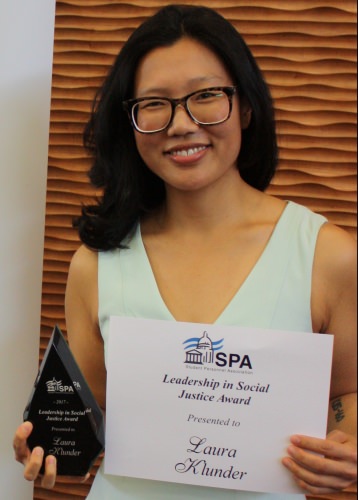
Laura Klunder
Klunder, director of the Our Wisconsin program within the Division of Student Life, built two programs from scratch: Our Wisconsin, a student-led inclusion program that was developed as an effort to build community among diverse populations on campus; and The Badger Way, an Our Wisconsin student employment opportunity that hires, trains, and supports student leaders in facilitating inclusion on campus.
“Laura has made outstanding contributions in her position, to the benefit of campus climate and the experiences of marginalized students, faculty, staff, and their communities at UW–Madison,” write nominators Katherine Charek Briggs and Mo Kappes. “Her impact in a challenging and high-stakes role has been immeasurable.”
For the first time this year, SPA also presented Future Leaders in Student Affairs awards, an inaugural honor intended to recognize students who have expressed interest in pursuing student affairs and have provided exceptional service to students during their time on campus. Winners Gloria Stendel and Samantha Hunter both attend Madison College.
The awards are made possible thanks to support from the Chancellor’s Office, the Norman Bassett Foundation, the Ineva Reilly Baldwin and Ira L. Baldwin Endowment for Student Services, the Division of Student Life and the SPA membership. The Chancellor’s Award recipient receives a cash award of $1,000; all others receive $500.
